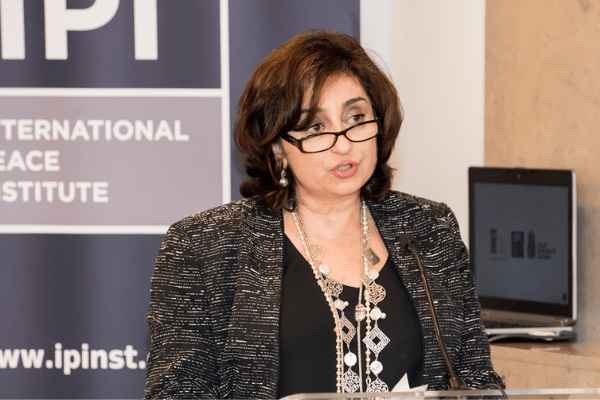More than 50 former staff members of UN Women sent an open letter to the new executive director of the agency, Bahous. They expect her to strengthen the voice and influence of feminist civil society in the governance of UN Women and the UN system.
United Nations Secretary-General António Guterres, following consultations with Member States and the Executive Board of the United Nations Entity for Gender Equality and Empowerment of Women (UN-Women), announced the appointment of Sima Sami Bahous of Jordan as Executive Director of UN-Women.
She succeeds Phumzile Mlambo-Ngcuka, to whom the Secretary-General is deeply grateful for her commitment and dedicated service in leading UN-Women. The Secretary‑General also wishes to extend his appreciation to the United Nations Special Representative on Sexual Violence in Conflict, Pramila Patten, who will continue to serve as Acting Executive Director until Ms. Bahous assumes the position.
A champion for women and girls, gender equality and youth empowerment, as well as a keen advocate for quality education, poverty alleviation and inclusive governance, Ms. Bahous brings to the position over 35 years of leadership experience at the grass‑roots, national, regional and international levels. It is coupled with expertise in advancing women empowerment and rights, addressing discrimination and violence and promoting sustainable socioeconomic development towards the achievement of the Sustainable Development Goals.
Ms. Bahous most recently served as Permanent Representative of Jordan to the United Nations in New York. Prior to that position, she served as Assistant Administrator and Director of the Regional Bureau for Arab States at the United Nations Development Programme (UNDP), from 2012 to 2016, and Assistant Secretary‑General and Head of the Social Development Sector at the League of Arab States, from 2008 to 2012.
She has also served in two ministerial posts in Jordan as President of the Higher Media Council, from 2005 to 2008, and as Adviser to King Abdullah II from 2003 to 2005. She was Media Adviser and Director of Communication for the Royal Hashemite Court from 2001 to 2003, Acting Executive Director for the King Hussein Foundation from 2000 to 2001 and Executive Director of the Noor al Hussein Foundation from 1998 to 2001. She also worked for the United Nations Children’s Fund (UNICEF) and with a number of United Nations and civil society organizations, and taught development and communication studies at various universities in Jordan.
Ms. Bahous holds a doctorate degree in mass communication and development from Indiana University, in the United States; a master’s degree in literature and drama from Essex University, in the United Kingdom; and a bachelor’s degree in English literature from Jordan University.
An open letter from from staff members of UN Women to Bahaous
More than 50 former staff members of UN Women sent a pointed open letter to the new executive director of the agency, Sima Sami Bahous, an ex-Jordanian diplomat, on Sept. 28. They suggest a comprehensive agenda for her, undertaking managerial reform and more actively and successfully promoting gender equality across the world.
“UN Women is the most significant example globally of institutionalizing the commitment to gender equality at the heart of a multilateral institution,” Anne Marie Goetz, a former director of peace and security at the agency, said in an email interview with PassBlue. “The rank of its executive director, her position on the secretary-general’s executive committee — these are signs that gender equality and women’s rights are recognized to be central to global governance, peace and development.” Goetz is a signatory to the letter.
The letter sets an ambitious goal: “UN Women’s task is to disrupt patriarchal power in the UN, in countries, and internationally, via the ways it delivers support, programs and policy initiatives,” it says. “Its task is to use its seat in the UN’s Senior Management Group and Executive Committee to center gender equality in everything that the UN does.” It should monitor and track the organization’s performance, the letter adds, and empower the relatively small agency’s country offices, many of which are understaffed.
The letter asks Bahous to spend her first 100 days in office listening to women’s rights activists and defenders everywhere while amplifying “the voice and influence of feminist civil society in the governance of UN Women and in the UN system.” Bahous was appointed to the post in September, for a four-year term.
The governance and management of the agency have been a problem for years, former employees say. The letter to Bahous reflects and reveals what needs to be fixed in tough terms:
“Installing a zero tolerance policy to end bullying, abuse of power, sexual harassment and exploitation by staff members, and ensuring inclusion, diversity and difference” should be priorities, the letter says.
While it advises that “The mantra that ‘we have enough feminists, what we need now are managers’ should never be a key message for UN Women,” it calls for upgrading management though recruitment of administration professionals who are “top notch feminists” to review and recommend changes “to internal procedures and Human Resources functions from a feminist perspective.”
Sources: UN Women, PassBlue


